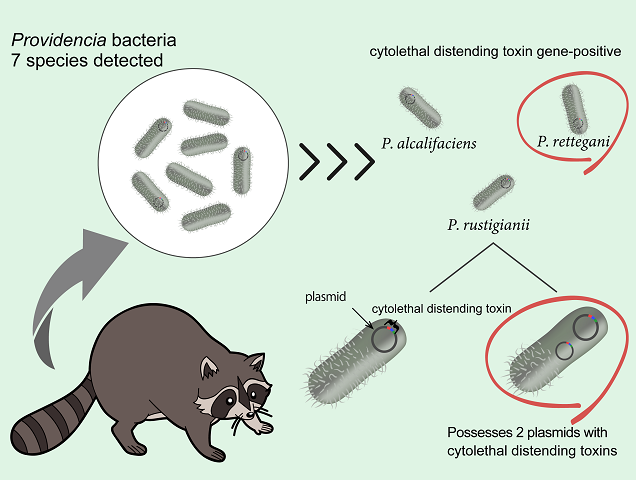Research News
Apr 24, 2025
- Veterinary Science
Wild raccoons as potential reservoir of cytolethal distending toxin-producing Providencia strains in Japan
Raccoons carrying pathogenic Providencia strains
Wild raccoons considered to be a source of zoonotic pathogens were monitored for the presence of Providencia species in Japan and analyzed for cytolethal distending toxin (cdt) genes.
Credit: Osaka Metropolitan University

In view of increasing reports of infections due to virulent Providencia species including cytolethal distending toxin (cdt) gene-positive strains, it is important to identify the reservoirs and transmission routes of such pathogenic strains.
Raccoons considered to be a source of zoonotic pathogens were monitored for the presence of Providencia species in Japan and analyzed for cdt genes. Of 384 wild raccoon rectal swabs analyzed, 60% were positive for Providencia species, of which 20% carried cdt-genes.
Among seven Providencia species isolated (P. alcalifaciens, P. rustigianii, P. rettgeri, P. stuartii, P. heimbachae, P. vermicola, and P. huaxiensis), cdt genes were distributed in P. alcalifcaiens (63%), P. rustigianii (16%), and novel in P. rettgeri (21%). Complete cdt gene clusters were identified in P. alcalifaciens and P. rustigianii strains, whereas P. rettgeri had intact cdtB but truncated cdtA and cdtC genes. Phylogenetic analyses showed divergent pulsotypes among the cdt gene-positive Providencia strains.
Cytotoxicity assay revealed that P. alcalifaciens and P. rustigianii produced CDT more toxic to eukaryotic cells compared to human clinical strains, which were neutralized by anti-PaCdtB serum. As expected, the P. rettgeri strains with truncated cdt genes had no biological activity. Molecular analysis revealed that all the cdt genes were located on plasmids as determined by S1-nuclease pulsed-field gel electrophoresis (S1-PFGE) and Southern hybridization assay.
Intriguingly, the cdtB gene in P. rustigianii strains was detected on dual plasmids. Notably, all the cdt gene-positive Providencia strains were found to carry plasmid-mediated T3SS-related genes.
These results suggest that wild raccoons are possible reservoir of virulent Providencia strains in Japan.
Paper information
Journal: Microbiology Spectrum
Title: Wild raccoons (Procyon lotor) as potential reservoir of cytolethal distending toxin producing Providencia strains in Japan
DOI: 10.1128/spectrum.02616-24
Authors: Okechukwu John Obi, Atsushi Hinenoya, Sharda Prasad Awasthi, Noritoshi Hatanaka, Shah M. Faruque, Shinji Yamasaki
Published: 25 February 2025
URL: https://doi.org/10.1128/spectrum.02616-24
Contact
Shinji Yamasaki
Graduate School of Veterinary Science
Email: yshinji[at]omu.ac.jp
*Please change [at] to @.
SDGs

